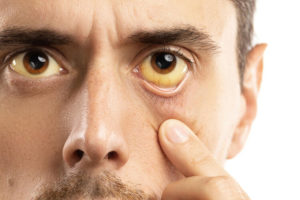 Did you know that your eyes can give clues about your health? The portion of the eye known as the sclera should appear white. If discolored, something has likely gone wrong. Yellowing eyes can be a result of various medical conditions, with jaundice being the most likely culprit.
Did you know that your eyes can give clues about your health? The portion of the eye known as the sclera should appear white. If discolored, something has likely gone wrong. Yellowing eyes can be a result of various medical conditions, with jaundice being the most likely culprit.
Jaundice is a condition that occurs when the oxygen-carrying components in the blood, called hemoglobin, break down into bilirubin and are not cleared by the body. Bilirubin is supposed to move through the liver and be expelled from the body, but if this doesn’t occur, it builds up and causes the skin – and in this case, eyes – to yellow. Alcoholic hepatitis, a condition that can develop in those who drink alcohol heavily, is linked to jaundice, as it takes a toll on the liver and prevents it from functioning properly. Those suffering from jaundice as the result of an infection may need to take antibiotics, antifungals or antivirals in order to begin improvement. If jaundice is the result of dietary habits, eating more fruit, vegetables and whole grains is recommended. Jaundice can also be a side effect of taking certain medications like acetaminophen, penicillins, oral contraceptives and anabolic steroids. Yellowing eyes as a result of jaundice is extremely common in newborns, as their livers haven’t matured yet. A medical professional should see to a newborn who has been afflicted with jaundice, however, most cases are harmless and will be resolved on their own with time. In older children and adults, yellow eyes usually indicate a more serious problem.
A number of medical conditions can also cause jaundice, including subconjunctival hemorrhage, leptospirosis and pancreatitis:
Jaundice from Subconjunctival Hemorrhage
A subconjunctival hemorrhage refers to the blood vessels in your eyes bursting or breaking and causing your eye to become discolored, usually a red or yellow hue. This condition doesn’t cause any pain but can cause the eye to feel itchy. This condition can be caused by trauma, hard coughing or sneezing, vomiting and heavy lifting, among others. To ease the feeling of scratchiness, artificial tears may be applied.
Jaundice from Leptospirosis
Leptospirosis is a condition caused by a bacterial infection and shows up in warmer climates where contaminated water can be found. Other side effects may include a cough, sore throat, headache, stomach pain and swollen lymph nodes. Antibiotics are used to treat this infection.
Jaundice from Pancreatitis
Pancreatitis, an infection of the pancreas, causes the pancreas to swell. This triggers stomach pain and can affect the liver, causing jaundice of the eyes and skin. Perhaps more serious than the previously mentioned conditions, those suffering should request a doctor’s care immediately.
If you have noticed yellowing eyes in yourself or a loved one, make an appointment with a medical professional immediately. Contact Eye Specialists of Louisiana and request an appointment with any one of our dedicated ophthalmologists.
